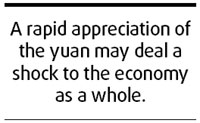Strong case for caution over RMB appreciation
By Liu Junhong (China Daily)
Updated: 2008-05-09 07:23
Updated: 2008-05-09 07:23
Since the central parity rate of the yuan breached the psychological mark of 7 against the US dollar on April 10, it has aroused wide concern in and out of the country on the renminbi exchange rate.
Given the complicated situation on the global financial market, it is impossible, at this moment, to predict when and where the yuan appreciation against the greenbacks would stop. And the yuan appreciation would deal comprehensive impacts on the Chinese economy.
Viewed against a global background, the renminbi appreciation is not dramatic, especially when it is compared with the appreciation of Japanese yen.

After the Chinese authorities started reforming its exchange rate scheme on July 21, 2005, it gained 15 percent against the US dollars in two years and eight months.
On August 15, 1971, the exchange rate of Japanese yen against the US dollar rose from 360 yen to 308 yen per dollar, 14 percent up in a single day.
After the Plaza Accord was signed in September 1985, the Japanese yen appreciated about 40 percent against the US dollar in 18 months.
The two dramatic rounds of appreciation of the Japanese yen had substantial impacts on the Japanese economy, which forced the country to upgrade its structure and improved its endurance to yen appreciation.
So there was speculation that the yuan appreciation may only have a limited influence on the Chinese economy since the appreciation took place in a relatively long period.
Yet, instead of pure statistics, the exchange rate issue should be judged upon an inclusive analysis of economic structure, industrial layout, the capability and profitability of the enterprises and financial institutions. Otherwise, the conclusion about the impacts of yuan appreciation could be ultra-superficial or even misleading.
As a matter of fact, the exchange rate of renminbi received unprecedented public attention as a result of the intensifying global concern over the issue since 2001.
After China became a member of the World Trade Organization (WTO) in 2001, it was a popular expectation across the world that China would embrace a new round of opening-up by attracting more international investment, nurturing further swell in its trade and fostering its economic boom.
A call for renminbi appreciation started in Japan in the spring of 2001. In 2003, an "alliance" was formed to press China for appreciating renminbi, with Japan, the United States and the European Union taking the lead.
Sensing all these overseas pressures, a heated debate went on among the media and the academia, which, later, spread to the public domain.
The reform of the renminbi exchange rate scheme was launched against such a background. This decisive change indicated the full confidence of the Chinese government in its capability to handle the economy. And behind this confidence is the continuous economic boom after its WTO entry.
In the economic theories, the exchange rate of a currency against others reflects the changes in the country's interest rate, price, employment, international balance of payment as well as the asset value. It is a pivotal index among all the economic indicators. Therefore, the exchange rate policy is at the core of the economic policies.
The international currency system has become an essential part in international relations since 1880. The exchange rate is no longer regarded only as an economic issue, but also from the angle of international politics and diplomacy. Hence, the exchange rate policy also has significance on a country's diplomatic agenda.
Judged only in the terms of economy, the yuan appreciation poses negative impacts to the country for two reasons.
A considerable portion of the Chinese trade volume was achieved through the processing factories. After the renminbi exchange rate rises, the prices of the imported parts for the processing businesses drop, but the prices of the finished products also fall because the processing margins remain the same. The yuan appreciation does not lend a hand to correct the trade imbalance.
For the Chinese banks, whose assets in foreign currencies are mostly in the US dollars, the yuan appreciation against the US dollars results in a shrinkage of their assets value and a slide in their final revenue.
The negative influences aside, the renminbi appreciation at a proper degree helps tackle the biggest headache for the policymakers at this moment. The global oil price began to pick up since 2000 and had a dramatic jump in 2004, which propped up the prices of all primary products around the world.
With a heavier reliance upon the imported raw materials and energy products, China is, in fact, subject to an "imported" inflation, which soon triggered an extensive price hike on the domestic market. So, an appreciated yuan could ease the inflation pressure from the global market.
However, the economic issues cannot be separated from each other.
If the yuan appreciated higher than its ideal level, the interest rate should be relatively high, which increases the financing costs of businesses and weakens their competitiveness against their foreign competitors.
Meanwhile, the stock price falls, the individual disposable income decreases, consumption drops, the businesses stop purchasing equipments and the overall supply is reduced. All these happenings would only push the inflation even higher.
Viewed from the angle of international affairs, a solid renminbi would increase China's leverage in international negotiations and maintain a good external environment for China's economic growth.
We must take a sober position about the renminbi appreciation. A rapid appreciation of the yuan may deal a shock to the economy as a whole.
The author is a researcher with China Institute of Contemporary International Relations
(China Daily 05/09/2008 page8)
|
|
|
|